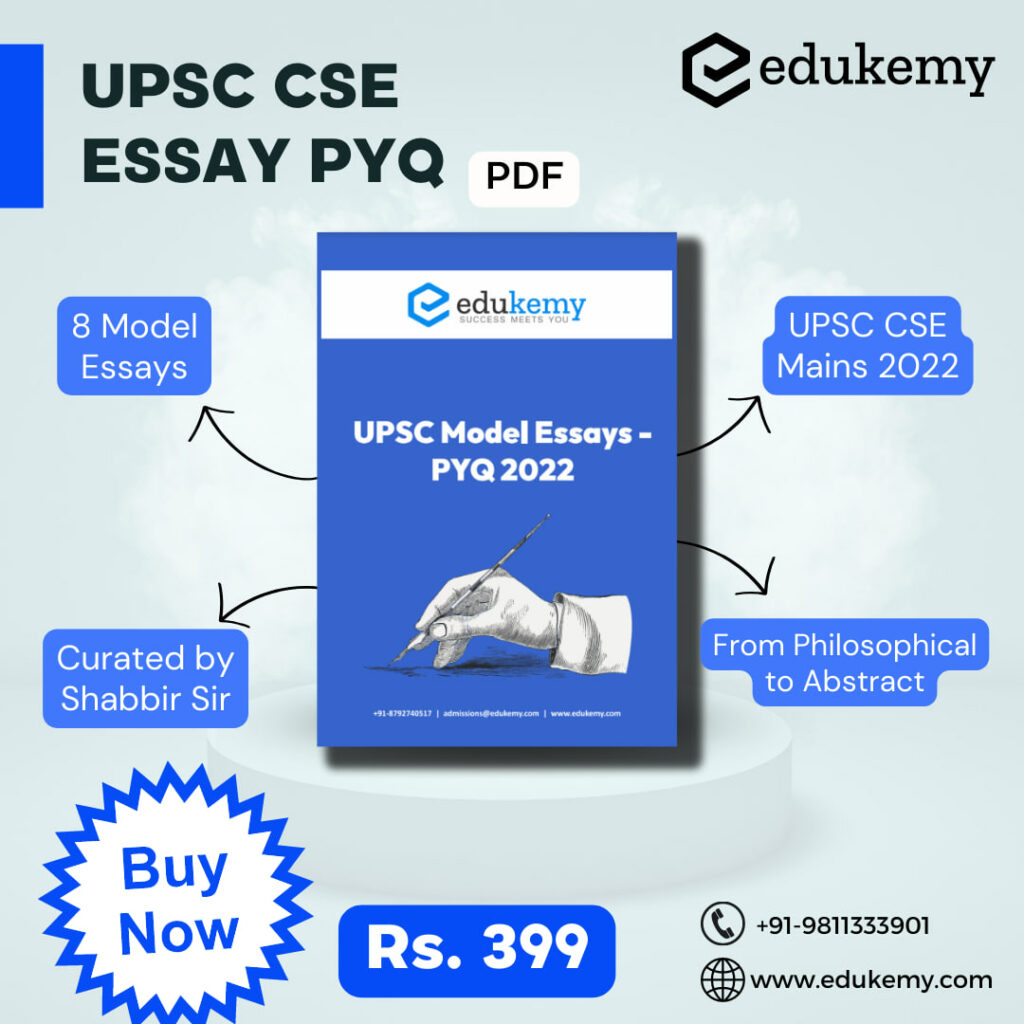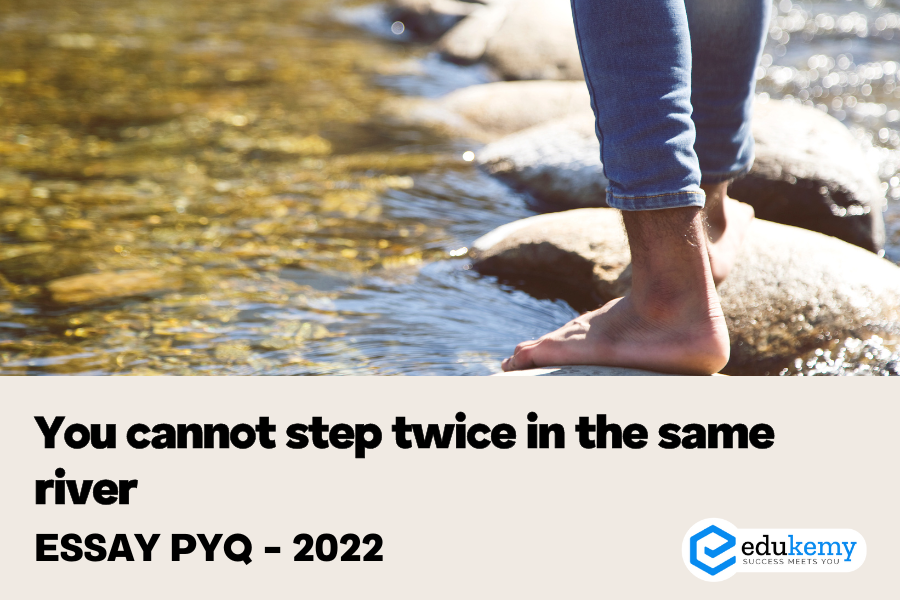Essay Previous Year Paper 2022- Click Here



The famous aphorism “You cannot step twice in the same river” encapsulates the essence of Heraclitus’ philosophical perspective, challenging our conventional understanding of stability and change. This profound statement reverberates through time, transcending its ancient origins to become a timeless contemplation on the nature of existence and the ever-shifting dynamics of life. Aspirants preparing for the UPSC Civil Services Examination in 2022 encountered this enigmatic phrase in the context of a question, prompting them to delve into the depths of philosophical inquiry and articulate their insights. In exploring the implications of this thought-provoking maxim, candidates were not merely addressing a philosophical concept but also demonstrating their ability to critically analyze ideas, a crucial skill for those aspiring to navigate the complexities of governance and leadership in the contemporary world. The examination’s inclusion of such profound themes underscores the importance of a holistic approach to knowledge, inviting candidates to engage with diverse disciplines and draw meaningful connections between philosophy and the challenges of governance.
Valmiki, a revered Indian author, crafted the epic Ramayana. Before his transformation into a saint, he was involved in acts of robbery and dacoity. However, as time passed, his perspective on the world underwent a profound change, leading him to renounce his criminal ways and embrace a saintly life. The river of time flowed on, altering his perception of the world, much like the transformed person he had become. The river no longer held the same significance for him as it once did.
The renowned Greek philosopher Heraclitus famously stated, “No man ever steps in the same river twice, for it’s not the same river and he’s not the same man.” This seemingly straightforward statement carries profound significance. The river symbolizes life itself, while the act of stepping into the river embodies the notion of change.
The world we inhabit is perpetually in motion. Change is an inherent part of our surroundings, and we cannot impede its progress. People enter and exit our lives, structures rise and fall, and nature undergoes ceaseless metamorphosis. Much like life, a river flows unceasingly, and each moment brings a unique experience. The water we step into is not the same as a mere second ago, and the river itself is not the same as it was only a minute prior.
This notion holds for every facet of life, encompassing both the external world and our existence. We are in a perpetual state of transformation, and the dynamic nature of our surroundings mirrors this evolution. Each encounter we have, every choice we make, and every individual we encounter leaves an indelible mark, shaping our present selves and influencing our future selves. Our perception of the world and our own identity is a fluid process, constantly adapting, and we are unable to revisit the past to alter our previous encounters
This principle is observable across various facets of life. Take, for instance, the sunrise. No two sunrises are identical; each unveils a distinct blend of colors, clouds, and weather conditions. The same principle applies to every day we encounter. Each day holds its individuality, presenting us with a distinct set of challenges, opportunities, and experiences. Even if we were to attempt to replicate a past day, we would be unable to fully recreate its essence.
Likewise, the seasons undergo a perpetual transformation, with each one showcasing its splendor and obstacles. We cannot encounter the same season twice, for each holds its distinctiveness and allure. The concept of uniqueness applies to relationships as well. Each relationship we engage in possesses its distinctiveness, encompassing its dynamics, history, and challenges. Even if we attempt to revive a past relationship, it will never precisely replicate its previous state. We cannot step into the same river of a relationship twice.
In India, the notion of impermanence is deeply woven into its culture and spirituality. For instance, Hinduism espouses the belief that life is in a constant state of flux, emphasizing the importance of adaptability. The concept of “Karma” teaches that every action carries consequences, which are not fixed but subject to perpetual change. India’s history also exemplifies this notion. The country boasts a rich and diverse historical narrative shaped by diverse rulers, cultures, and religions. Each period in India’s history holds its distinctiveness, characterized by a unique set of challenges, opportunities, and experiences. For instance, the Mughal era witnessed a harmonious fusion of Indian and Islamic cultures, giving rise to splendid art, music, and architecture. In contrast, the British era ushered in modernization and the introduction of Western ideas, leaving a profound impact on India’s social and political fabric.
The adage of not stepping into the same river twice resonates profoundly in the current global scenario. The rapid spread of the virus has compelled many individuals to adapt to remote work, constituting a significant change in their lives. The ensuing isolation has necessitated a reevaluation of approaches to life, prompting a global search for novel means of connection and communication.
So, the question arises: if everything is in a state of flux, how can one harness that to their advantage? In today’s dynamic environment, where change occurs at lightning speed, the ability to adapt is crucial. To thrive, it is essential to embrace change and recognize that it brings forth opportunities. The magnitude of the opportunity often aligns with the magnitude of the change.
With a fresh perspective, let’s explore how one can approach work with enhanced efficiency and how personal growth can enable a different problem-solving approach. Each day presents a unique experience, and every individual carries a distinct outlook. As the saying goes, “Problems cannot be solved by the same level of thinking that created them.” When one elevates their thinking to address challenges, a transformative change occurs.
Take, for example, the freedom movements led by Mahatma Gandhi. Each movement aimed at achieving freedom and self-rule, yet they were distinct from one another. The non-cooperation movement, abruptly terminated after the Chauri Chaura incident in 1922, differed from the civil disobedience movement of the 1930s and the Quit India movement in 1942. With each new movement, Gandhi employed different strategies, exhibited stronger determination, and garnered increased mass support, ultimately contributing to the attainment of independence.
However, it is important to acknowledge contrasting viewpoints. Some may argue that this statement holds only partial truth. While it is true that the river is in constant flux, certain elements remain consistent. For instance, the river’s general location and structure may endure despite changes in the water flowing through it.
Moreover, one can argue that the assertion “You cannot step twice in the same river” is subjective due to individual perceptions of the same experience. For instance, one person may perceive stepping into the river twice as yielding a distinct encounter, whereas another may perceive it as identical.
Furthermore, the statement can be challenged by the notion that human memory is fallible. This implies that even if someone steps into the same river twice and perceives a difference, it could be attributed to their unreliable recollection of the experience.
Amidst all these perceptions and transformations, it is essential to recognize that impermanence can bring positive outcomes. Change can catalyze growth and development. By embracing change, we open ourselves to new knowledge, connections, and experiences, fostering personal and societal progress.
As the adage suggests, “change is the only constant in this world,” and everything is continuously transitioning into something new. Change permeates all aspects of life and remains an unwavering presence. Hence, it becomes crucial for us to acknowledge this reality and actively embrace change in our lives. By doing so, we align ourselves with the rhythm and harmony of this transformative process.
Contents
- 1 Frequently Asked Questions (FAQs)
- 1.1 1. Question: What is the significance of the statement “You cannot step twice in the same river” in Heraclitus’ philosophy?
- 1.2 2. Question: How does Heraclitus’ idea of constant change relate to the socio-political context of today?
- 1.3 3. Question: How can the concept of “You cannot step twice in the same river” be applied in the field of economics?
Frequently Asked Questions (FAQs)
1. Question: What is the significance of the statement “You cannot step twice in the same river” in Heraclitus’ philosophy?
Answer: The statement encapsulates Heraclitus’ view on the nature of reality and the concept of perpetual change. According to him, the world is in a constant state of flux, and no two moments are identical. The river symbolizes the ever-flowing nature of time and existence. Heraclitus believed that change is fundamental, and trying to hold onto the past is futile. This philosophical perspective encourages an understanding of the dynamic and transient nature of the world.
2. Question: How does Heraclitus’ idea of constant change relate to the socio-political context of today?
Answer: Heraclitus’ philosophy of constant change finds relevance in the socio-political context of today by highlighting the importance of adaptability and resilience. In the dynamic landscape of global affairs, political systems, and social structures, the ability to embrace change becomes crucial. Policymakers and leaders can draw insights from Heraclitus’ teachings to navigate uncertainties, fostering a mindset that values flexibility, innovation, and the ability to evolve with the ever-changing circumstances.
3. Question: How can the concept of “You cannot step twice in the same river” be applied in the field of economics?
Answer: In the realm of economics, Heraclitus’ statement underscores the dynamic and unpredictable nature of economic systems. Economic conditions are subject to constant fluctuations, influenced by factors such as technological advancements, market trends, and global events. Policymakers and economists need to acknowledge and adapt to these changes rather than assuming a static model. The concept encourages the development of economic strategies that are responsive to evolving circumstances, fostering resilience in the face of uncertainty.
In case you still have your doubts, contact us on 9811333901.
For UPSC Prelims Resources, Click here
For Daily Updates and Study Material:
Join our Telegram Channel – Edukemy for IAS
- 1. Learn through Videos – here
- 2. Be Exam Ready by Practicing Daily MCQs – here
- 3. Daily Newsletter – Get all your Current Affairs Covered – here
- 4. Mains Answer Writing Practice – here
Visit our YouTube Channel – here

